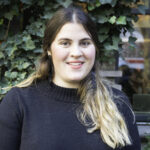
Emily Chrislip, 25, of Magic Valley, Idaho, signed up to be a surrogate to help other couples become parents. She was more than excited when she matched with a couple that lived in China, but little did she know at the time that the coronavirus pandemic would change their plans completely. Chrislip was able to carry the couple’s unborn baby to term, but after the pandemic spread to the United States, it became clear there was no way for the couple to come get their baby. It left the surrogate in an odd position, and months after the baby’s birth, she’s still in Chrislip’s care.
Chrislip knew she wanted to become a surrogate after the birth of her son in 2018.
She talked it over with her husband, Brandon, and with his blessing, she started the process of becoming a surrogate in February 2019, KIVITV reported.
“We couldn't imagine what we would do without our own biological child, so we started looking into surrogacy and applied to some California agencies,” she recalled.
In September 2019, Chrislip finally matched with her first surrogacy case, a couple from China.
Things started off smoothly. Chrislip became pregnant with their child, and everything was normal — until two months before she was due to give birth.
That was when the coronavirus was in full swing.
As it became clear that this was a global pandemic, travel restrictions were placed on international travel, and soon their plans would need to be changed.
“So the plan was to get here before the due date, and we were going to let them be in the delivery room,” Chrislip explained to the news station.
“They were going to be a part of it, see her be born. So when she was born, they were supposed to get their own room at the hospital with the baby, and my husband and I would've had our own room, and my job was done at that point.”
Because of flight restrictions, the baby’s biological parents asked if Chrislip and her husband would be willing to care for the baby just a little bit longer.
The original plan was for the biological parents to arrive in the States before Chrislip’s due date in May.
“I actually had some people I work with ask what about the baby's parents, and I was like, 'Oh shoot I don't know what's going to happen,' and so that's what started bringing up conversations like, 'ok, what's going to happen if they can't get here?,'” she continued.
Four months later, Chrislip is still on the clock, so to speak.
The bio parents had the option of having a nanny agency care for the baby girl, who was born May 18, until they could get there but asked Chrislip and her husband to care for the child instead.
At first they thought it would be “max four weeks.”
“And then it kept getting longer and longer,” she explained to People.
“At this point, we've just accepted that we don't know … but we wouldn't have it any other way. She is so loved and right now, we are the constant in her life,” she added.
As time passes, Chrislip says it’s been bittersweet to raise a baby that isn’t hers.
She told People that she believes it’s been easier on her than on her husband.
“He loves babies and kids and is a big softy," she explained. "I try to keep some of my barriers up, but I don't know about Brandon.
“We definitely love her and will always care for her but we understand she is not ours,” she added. “We just treat her as our own because at this stage in life it is so important to have the proper attention and love."
The Chrislips still don’t know when the bio parents will be able to pick up their baby.
Currently, China is only allowing one fight to the United States per week, KIVITV reported, making it near impossible for them to make the trip. So the Chrislips are taking things “day to day” and are focusing on how to keep the infant safe while she’s in their care.
As for the future, Chrislip is hesitant to try surrogacy again after her experience.
“I think if this pandemic didn't occur, I would consider it more," she said. "I don't know if I could go through something like this again. I would consider it for the same parents, though, if they ever wanted to have more children.”
It's not that the experience has been bad, she clarified. She’s learned how to love a child “that is not biologically mine as much as I can my own child,” she said.
And she has learned that there are “limits” to her “mental and emotional strength.”
“I am such a planner in everything I do, that not having a plan was difficult at first,” she explained. “But I have learned to accept that what will be, will be, and to just live in the moment and take it a day at a time.”




